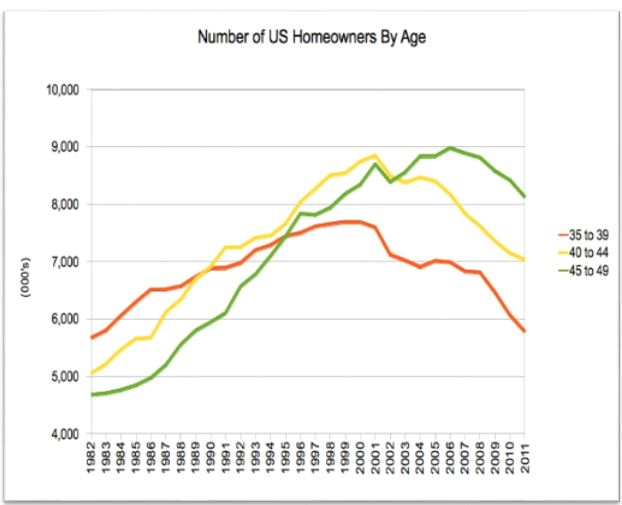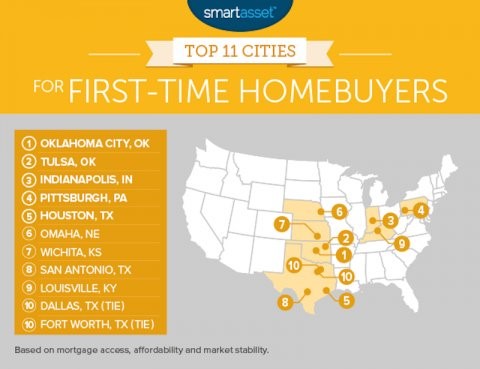Less than 35% of adults under 35 own a home.
This figure is the result of research undertaken by SmartAsset, a personal finance site.
If you are in your twenties or early thirties, it may seem like an intimidating process.
If you know where to look and find some advice, it is definitely possible.
Student debt is one cause of a young adult’s decision not to purchase a house.
While it is advantageous for them to attend school, in a recession it is adversely affecting house sales.
Low housing sales will result in low residential investment, construction, and a decline in housing services.
Despite this debt, it is still baffling why this decline has happened with lower interest rates over the last 30 years.
It is easier to get a mortgage loan; women are getting promoted in the workplace and are able to supplement their spouse’s wages.
What do you have to have to purchase a home?
Three things are needed – a mortgage, a down payment, and it would seem, a spouse.
Couples will buy a house when they are planning to get married.
Overall, people are worried about the economy.
There is a real concern that the present state of the economy will negate a couple’s earnings with inflation, recession, or job loss.
This applies to the population as a whole.
Best Cities for First-Time Homebuyers.
In 2016, SmartAsset published its findings in the best cities for first-time homebuyers in the US.
Every US city with over 300,000 residents was ranked.
The ratings were based on seven metrics:
- The number of mortgage lenders
- The rates of loan funding
- Value per square foot
- Affordability share (share of household income to owner costs)
- Homeowner constancy
- Market stability
- The number of quarters that home prices waned since 2010
The best cities for first home buyers are in Oklahoma and Texas.
It is also useful to look at Loan Funding Rates and the Average Monthly Mortgage in each city:
Make the Process of Buying a Home as Productive as Possible.
At present, interest rates are at record lows.
Now could be the perfect time to purchase your first home.
You should follow these tips to have an easier road to home ownership.
- Be aware of your numbers – check your credit score. A score below 650 means interest rates will be high, and you should reduce debts first.
- Find an agent – talk to friends and associates.
- Nail down a budget – spend time with an agent or financial planner to work out a practical budget.
- Watch credit card debt – get debt under control and if possible pay it off.
- Do your homework and choose wisely – look at different lenders for the best deal.
Whether to Rent or Buy
Perhaps you are wondering whether you would be better off renting or buying.
The real estate industry tries to persuade us to consider home ownership as a way of becoming wealthy.
It is not always the best way to go financially.
There are benefits, namely stability and freedom.
You are not controlled by a landlord, and you can decide what to do with the property.
However, there are costs involved with taxes, interest, insurance, and maintenance, which can be more expensive than renting.
To find out if houses in your area are fairly priced, you can check the rent ratio.
You find two houses, condos or apartments that are similar.
One would be for sale, the other for rent.
Divide the sale price by the annual rent.
A ratio above 20 indicates that the monthly cost of owning a property will be higher than the cost of renting.
It is useful to consider these questions if you are considering whether to rent or buy.
It is essential that you do your homework before making this life changing decision.
If the chart indicates that you would be better off renting, it doesn’t mean you have to rent for a lifetime.
In six months or a year, even weeks your position might change. Your decision might change too.
What to do When Choosing a City
- Make a List – write down the cities and regions that come to mind. Do some research to ascertain what you are looking for.
- Research – conduct a web search, speak to people and read guidebooks. Learn about the history, the culture, the scenery, and the economy. If possible, talk to someone who has resided there, keeping in mind people have different tastes.
- Observe the trends – look for common shared trends between the places under consideration. This will help you focus on the kind of place you are looking for.
- Visit – if possible, stay for a while in order to establish if it meets all your requirements.
- Consider the culture – this involves the music scene, the party scene, and the food scene. It includes anything that will add to your quality of life.
- Understand the climate – is it hot or cold, dry or wet, near the coast or the mountains.
- Is there a risk of natural disasters – is there a high threat of hurricanes, tornadoes, numerous earthquakes; is it susceptible to drought or storms.
- Consider work – include present and future careers. Look at areas that have the jobs you are most interested in.
- Take money into consideration – choose a place that you can afford but also gives you the opportunities you are seeking. You need to be aware that places which provide you with the most opportunities are also more expensive to live in.
When choosing an area, don’t let money be the only factor.
Yes, you should choose a place where you will be able to provide for yourself.
However, you should also be enthusiastic about the place you are going to.
While finding the cheapest cities is advisable, there are other factors to consider.
Sometimes, making the decision to buy is overwhelming.
Perhaps, renting is a better alternative for the present.
Whatever you decide, do your homework.










Leave A Comment